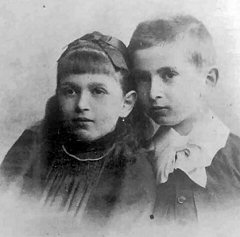Related Research Articles
Psychoanalysis is a set of theories and therapeutic techniques that deal in part with the unconscious mind, and which together form a method of treatment for mental disorders. The discipline was established in the early 1890s by Sigmund Freud, whose work stemmed partly from the clinical work of Josef Breuer and others. Freud developed and refined the theory and practice of psychoanalysis until his death in 1939. In an encyclopedic article, he identified the cornerstones of psychoanalysis as "the assumption that there are unconscious mental processes, the recognition of the theory of repression and resistance, the appreciation of the importance of sexuality and of the Oedipus complex." Freud's colleagues Alfred Adler and Carl Gustav Jung developed offshoots of psychoanalysis which they called individual psychology (Adler) and analytical psychology (Jung), although Freud himself wrote a number of criticisms of them and emphatically denied that they were forms of psychoanalysis. Psychoanalysis was later developed in different directions by neo-Freudian thinkers, such as Erich Fromm, Karen Horney, and Harry Stack Sullivan.

Sigmund Freud was an Austrian neurologist and the founder of psychoanalysis, a clinical method for evaluating and treating pathologies seen as originating from conflicts in the psyche, through dialogue between patient and psychoanalyst, and the distinctive theory of mind and human agency derived from it.

Alfred Ernest Jones was a Welsh neurologist and psychoanalyst. A lifelong friend and colleague of Sigmund Freud from their first meeting in 1908, he became his official biographer. Jones was the first English-speaking practitioner of psychoanalysis and became its leading exponent in the English-speaking world. As President of both the International Psychoanalytical Association and the British Psycho-Analytical Society in the 1920s and 1930s, Jones exercised a formative influence in the establishment of their organisations, institutions and publications.
Psychoanalytic literary criticism is literary criticism or literary theory that, in method, concept, or form, is influenced by the tradition of psychoanalysis begun by Sigmund Freud.
In psychoanalytic theory, the id, ego and superego are three distinct, interacting agents in the psychic apparatus, defined in Sigmund Freud's structural model of the psyche. The three agents are theoretical constructs that Freud employed to describe the basic structure of mental life as it was encountered in psychoanalytic practice. Freud himself used the German terms das Es, Ich, and Über-Ich, which literally translate as "the it", "I", and "over-I". The Latin terms id, ego and superego were chosen by his original translators and have remained in use.
In psychoanalysis, psychosexual development is a central element of the sexual drive theory. According to Freud, personality develops through a series of childhood stages in which pleasure seeking energies from the child become focused on certain erogenous areas. An erogenous zone is characterized as an area of the body that is particularly sensitive to stimulation. The five psychosexual stages are the oral, the anal, the phallic, the latent, and the genital. The erogenous zone associated with each stage serves as a source of pleasure. Being unsatisfied at any particular stage can result in fixation. On the other hand, being satisfied can result in a healthy personality. Sigmund Freud proposed that if the child experienced frustration at any of the psychosexual developmental stages, they would experience anxiety that would persist into adulthood as a neurosis, a functional mental disorder.

Karl Abraham was an influential German psychoanalyst, and a collaborator of Sigmund Freud, who called him his 'best pupil'.

Studies on Hysteria is an 1895 book by Sigmund Freud, the founder of psychoanalysis, and the physician Josef Breuer. It consists of a joint introductory paper ; followed by five individual studies of hysterics – Breuer's famous case of Anna O., seminal for the development of psychoanalysis, and four more by Freud— including his evaluation of Emmy von N— and finishing with a theoretical essay by Breuer and a more practice-oriented one on therapy by Freud.
In psychology, intellectualization (intellectualisation) is a defense mechanism by which reasoning is used to block confrontation with an unconscious conflict and its associated emotional stress – where thinking is used to avoid feeling. It involves emotionally removing one's self from a stressful event. Intellectualization may accompany, but is different from, rationalization, the pseudo-rational justification of irrational acts.
In classical Freudian psychoanalytic theory, the death drive is the drive toward death and destruction, often expressed through behaviors such as aggression, repetition compulsion, and self-destructiveness. It was originally proposed by Sabina Spielrein in her paper "Destruction as the Cause of Coming Into Being" in 1912, which was then taken up by Sigmund Freud in 1920 in Beyond the Pleasure Principle. This concept has been translated as "opposition between the ego or death instincts and the sexual or life instincts". In Beyond thePleasure Principle, Freud used the plural "death drives" (Todestriebe) much more frequently than the singular.

Dora is the pseudonym given by Sigmund Freud to a patient whom he diagnosed with hysteria, and treated for about eleven weeks in 1900. Her most manifest hysterical symptom was aphonia, or loss of voice. The patient's real name was Ida Bauer (1882–1945); her brother Otto Bauer was a leading member of the Austro-Marxist movement.

The Ego and the Id is a prominent paper by Sigmund Freud, the founder of psychoanalysis. It is an analytical study of the human psyche outlining his theories of the psychodynamics of the id, ego and super-ego, which is of fundamental importance in the development of psychoanalysis. The study was conducted over years of research and was first published in the third week of April 1923.
Father complex in psychology is a complex—a group of unconscious associations, or strong unconscious impulses—which specifically pertains to the image or archetype of the father. These impulses may be either positive or negative.

James Beaumont Strachey was a British psychoanalyst, and, with his wife Alix, a translator of Sigmund Freud into English. He is perhaps best known as the general editor of The Standard Edition of the Complete Psychological Works of Sigmund Freud, "the international authority".

In neo-Freudian psychology, the Electra complex, as proposed by Swiss psychiatrist and psychoanalyst Carl Jung in his Theory of Psychoanalysis, is a girl's psychosexual competition with her mother for possession of her father. In the course of her psychosexual development, the complex is the girl's phallic stage; a boy's analogous experience is the Oedipus complex. The Electra complex occurs in the third—phallic stage —of five psychosexual development stages: the oral, the anal, the phallic, the latent, and the genital—in which the source of libido pleasure is in a different erogenous zone of the infant's body.

In classical psychoanalytic theory, the Oedipus complex refers to a son's sexual attitude towards his mother and concomitant hostility toward his father, first formed during the phallic stage of psychosexual development. A daughter's attitude of desire for her father and hostility toward her mother is referred to as the feminine Oedipus complex. The general concept was considered by Sigmund Freud in The Interpretation of Dreams (1899), although the term itself was introduced in his paper A Special Type of Choice of Object made by Men (1910).
Penis envy is a stage in Sigmund Freud's theory of female psychosexual development, in which young girls experience anxiety upon realization that they do not have a penis. Freud considered this realization a defining moment in a series of transitions toward a mature female sexuality. In Freudian theory, the penis envy stage begins the transition from attachment to the mother to competition with the mother for the attention and affection of the father. The young boy's realization that women do not have a penis is thought to result in castration anxiety.

Sigmund Freud, the founder of psychoanalysis, viewed homosexuality, like all forms of sexuality, as being caused by a combination of biological, social and psychological factors. According to Freud, humans are born with unfocused sexual libidinal drives; he regarded homosexuality as a particular form of variation in the developmental process of the sexual function.
In the psychoanalysis of Sigmund Freud, afterwardsness is a "mode of belated understanding or retroactive attribution of sexual or traumatic meaning to earlier events. Nachträglichkeit, is also translated as deferred action, retroaction, après-coup, afterwardsness". As summarized by another scholar, 'In one sense, Freud's theory of deferred action can be simply stated: memory is reprinted, so to speak, in accordance with later experience'.

Introduction to Psychoanalysis or Introductory Lectures on Psycho-Analysis is a set of lectures given by Sigmund Freud, the founder of psychoanalysis, in 1915–1917. The 28 lectures offer an elementary stock-taking of his views of the unconscious, dreams, and the theory of neuroses at the time of writing, as well as offering some new technical material to the more advanced reader.
References
- ↑ Sigmund Freud, Standard Edition X (London 1955), p. 35
- ↑ Sigmund Freud, Case Histories II (London 1991), p. 191
- ↑ Jose Bruner, Freud and the Politics of Psychoanalysis (2001), p. 161
- ↑ Julia Kristeva/Jeanine Herman, The Sense and Non-Sense of Revolt (Columbia 2001), p. 13
- ↑ J. Rose, The Haunting of Sylvia Plath (1991) p. 195
- ↑ E. Berne, Sex in Human Loving (1974) p. 148
- ↑ S. Akhtar, Comprehensive Dictionary of Psychoanalysis (2009) p. 72